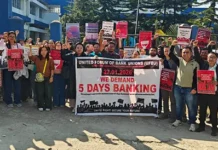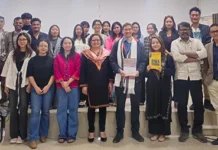Monday Musing
[ Tongam Rina ]
With the announcement of the BJP’s official candidates for the panchayat elections and for the municipal corporations of Pasighat and Itanagar, the other political parties waiting for leftover candidates are also finally done waiting.
The BJP had too many contenders for its tickets, and the split in the party will be wide open as the disgruntled will ultimately wander off for a short while to contest these polls.
But most of them are unlikely to join the Congress or any other party, because coming back to the BJP may be technically a bit more difficult now with stronger defection law.
Since the BJP wishes to win as many seats uncontested – much against the very tenets of democracy – the party is watching with keen interest those not following the party line.
The Arunachal Pradesh Local Authorities (Prohibition of Defection) Act will come useful for the administration as well as the BJP, and there is already an official mandate that any member of ZP/GP found indulging in anti-party activity will be liable for disqualification.
One may also recall that several zilla panchayat leaders from the Yachuli constituency were disqualified from their posts for violating the Defection Act. Even the Gauhati High Court upheld the decision by the administration, as they had sought relief following their disqualification.
It was a bit complicated, given that Lower Subansiri had been bifurcated and Keyi Panyor had only just become a district following the bifurcation -without a corresponding zilla parishad – but defection is, well, defection.
The PR leaders had resigned from the BJP and announced a merger with the NCP (Ajit Pawar) just before the assembly elections, leading to their disqualification under Section 3(1)(a) of the Arunachal Pradesh Local Authorities (Prohibition of Defection) Act.
Also in 2019, the BJP expelled several of its PR leaders for anti-party activities, just after the election. This time it won’t be much different, but there will be provisions for them to come back before the legislative assembly poll! There is nothing so rigid in party politics, because all that matters is numbers, not rigidity.
Thanks to the 73rd Constitutional Amendment Act, 1992, which gave constitutional status to the panchayati raj system, and the 83rd amendment of the Indian Constitution, which was Arunachal-specific with regard to tribal reservations, one thing that makes local polls different from legislative assembly or parliamentary elections is that they give opportunities to women leaders, who are often sidelined in higher-level leadership roles, with reservations ensuring their participation.
A minimum of one-third of the total seats to be filled by direct elections are reserved for women, and these seats are allocated by rotation to different constituencies.
In many cases where seats have been allocated to women, it will be close relatives of male politicians who will be made candidates in some of the women’s reserved seats. Since the reservation is rotational, many know beforehand which constituencies will have female representation, giving them ample time to groom their relatives as candidates. The first time reservation was implemented, most women candidates were reluctant leaders and were merely stepping in for their male relatives.
Though not so often now, there were times when male relatives often accompanied these elected women leaders to official meetings.
One husband of a PR leader famously hoisted the national flag on a national day after the circle office invited him instead of her, which also reflects the administration’s apathy toward women’s leadership.
The enthusiastic gentleman is now a contender for a zilla parishad seat for the BJP.
The scenario of such desperation and undermining of elected women leaders have changed drastically in the last two decades, though there are still instances where the real power continues to rest with the male relatives. But in most segments across the state, it will be women – this time willingly.
The amendment mandates at least one-third of the total seats, but 21 states and two union territories have provisions in their respective State Panchayati Raj Acts or Rules for 50 percent reservation for women in panchayats, while Arunachal Pradesh – a state that still sees women as just party workers not capable of leadership roles – has stuck to the mere obligatory reservation.
But if there is one district that has the attention of those interested in local polls and women’s participation, it is Namsai district, where a former MLA and a former BJP candidate for the legislative assembly are contenders on the BJP ticket. Denied a ticket in the 2024 legislative elections, former MLA Jummum Ete Deori is the party’s candidate for Lekang, while Chow Sujana Namchoom, who was chosen over her as the BJP’s official MLA candidate, is the nominee for the Namsai zilla parishad constituency. Once bitten, the BJP is taking no chances in Namsai after the party famously lost the MLA seat to NCP (Ajit Pawar)’s Likha Soni due to infighting within the party.
While it is a foregone conclusion that the BJP will sweep the polls, in many areas voters will not be able to make money, as most places will likely see no contest. Such a trend is not necessarily healthy for democracy, because unless voters are given a chance to vote, it becomes akin to the party choosing on behalf of the people. A picnic by the riverside will come to the rescue of these deprived voters.
Further reading
- Amendment to Panchayati Raj Act: Political exigency or fiscal prudence? | The Arunachal Times
- 73rd Constitutional Amendment Act, 1992 | Ministry Of Panchayati Raj | India
- Amendment Acts | Legislative Department | India (83rd amendment of Indian Constitution)





